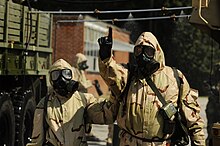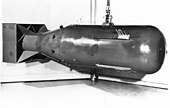
| Part of a series on |
| Terrorism |
|---|
| Nuclear weapons |
|---|
 |
| Background |
| Nuclear-armed states |
|
Nuclear terrorism refers to any person or persons detonating a nuclear weapon as an act of terrorism (i.e., illegal use of violence for a political or religious cause).[1] Nuclear terrorism outlines a broad category of possible terror incidents, ranging in feasibility and scope. Possible methods include the sabotage of a nuclear facility, the intentional irradiation of citizens, and/or the detonation of a radiological device, colloquially termed a dirty bomb, but consensus is lacking. According to the 2005 United Nations International Convention for the Suppression of Acts of Nuclear Terrorism.[2] nuclear terrorism is an offense committed if a person unlawfully and intentionally "uses in any way radioactive material … with the intent to cause death or serious bodily injury; or with the intent to cause substantial damage to property or to the environment; or with the intent to compel a natural or legal person, an international organization or a State to do or refrain from doing an act."
The possibility of terrorist organizations using nuclear weapons has been identified by nuclear powers and considered since the conception of nuclear weapons and the rise of global terrorism. Nuclear powers collaborate to prevent terror organization's from acquiring nuclear weapons and fuel.
It is considered plausible that terrorists could acquire a nuclear weapon.[3] As such, countries such as China and the UK have taken steps to restrict access to nuclear weapons and materials. Restrictions being implemented are only a small part of prevention systems that are being researched in countries. Preventing nuclear terrorism is a topic that interests counties who are developing or expanding their nuclear warhead knowledge. Whether it be through policy, summits, or warhead detection and disablement, the idea of threatening another nation is a worry that comes with the notion of war. Nonetheless, despite thefts and trafficking of small amounts of fissile material, there is no credible evidence that any terrorist group has ever obtained or produced nuclear materials of sufficient quantity or purity to produce a viable nuclear weapon.[4][5]
- ^ "Nuclear Security Dossier: Nuclear Terrorism Fact Sheet". Harvard Kennedy School, Belfer Center for Science and International Affairs. Archived from the original on 17 January 2013. Retrieved 28 January 2013.
- ^ "International Convention for the Suppression of Acts of Nuclear Terrorism - Article 1" (PDF). United Nations. 2005. Archived (PDF) from the original on 4 August 2019. Retrieved 13 April 2012.
- ^ Nuclear Terrorism: Frequently Asked Questions, Belfer Center for Science and International Affairs, September 26, 2007, archived from the original on October 21, 2016, retrieved December 5, 2008
- ^ Matthew Bunn. Preventing a Nuclear 9/11 Archived 2014-03-01 at the Wayback Machine Issues in Science and Technology, Winter 2005, p. v.
- ^ Ajay Singh. Nuclear terrorism — Is it real or the stuff of 9/11 nightmares? Archived 2014-02-21 at the Wayback Machine UCLA Today, February 11, 2009.